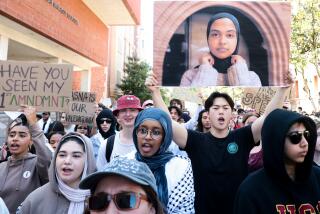Literacy opens wider vistas
In her one-bedroom apartment in the Pico-Union district, garment worker Julia Rodriguez lives surrounded by young readers.
Her oldest child, 10-year-old Santos, is giving Harry Potter a try. Nine-year-old Wendy devours girl-detective stories. Even her youngest, 6-year-old Marlyn, zips through early-reader books.
“Tim spins,” Marlyn reads from her book. “Tim spins his hat.”
Julia listens to her daughter and beams. Until recently, the 34-year-old mother of three couldn’t read the simplest sentence in any language. Having been illiterate most of her life, she feels deep, bittersweet emotions watching her children master reading.
Earlier this year, in the classrooms of the nonprofit Centro Latino for Literacy, Julia finally started learning to read and write herself.
It wasn’t easy. She nearly gave up after six frustrating months in the classroom. “I would study there and I could read, but as soon as I left I would start to forget,” she told me in Spanish. “It just wouldn’t stick.”
Her son wouldn’t let her quit. He had seen the look on his mom’s face when he brought home permission slips from school and she couldn’t even sign them. He had watched her ask the neighbors in their apartment building to read countless letters for her.
“I told him, ‘I can’t do it, I think I’m not going to go back,’ ” Julia remembers. “And he told me, ‘No, Mommy. You have to go back.’ ”
Last week, I described how Julia, Mercedes Meza and Juan Contreras struggled for years illiterate in L.A. Mercedes was born in a Honduran village without a school, and Julia and Juan were forced at a young age to work to support their Mexican families. They never learned to read in their native countries.
Mercedes, a Hollywood housekeeper, was approaching retirement age without ever having read or written a letter. Juan, a 60-year-old restaurant cook, had used his ingenuity and memorization skills to survive in L.A. without being able to read for 35 years.
The three of them, who all took classes at the Centro Latino, told me that living in Los Angeles and being unable to read or write was like being blind.So what is it like to break the code of written language late in adulthood and suddenly have that jumble come into focus?
“I was asleep before,” Julia told me in Spanish. “Before, there was no sun for me. Now I feel mas despierta,” more awake, she said.
Even walking around the city is different, she said: “I know what street I’m standing on. And I can look for the name of the street I’m going to.”
Many of you were angry at me last week for suggesting we Californians have a responsibility to help bring people like Julia, Juan and Mercedes into the fold of the literate.
“No, silly liberal -- it is not our shame that many immigrants cannot read,” a guy called Steve wrote. “The inequities and inadequacies of their homelands are what brought them here in the first place.”
You won’t get any argument from me on that last point, Steve. But you’re not seeing the whole picture.
We Angelenos benefit from Latin American rural poverty because it allows us to pay less for clothes, restaurant meals, child care and countless other goods and services.
By accepting the fruit of their sweat and toil, we make these immigrants part of that extended group of interdependent strangers that is our community.
Centro Latino and the other adult literacy groups work to address this California inequity. By creating readers, they create citizens -- in the broadest sense of the word -- because only by reading and writing can one become fully engaged in, and informed about, the broader world.
Mercedes Meza desperately wanted to read and write, ever since she turned 20 and moved out of the Honduran plantation where she was born and raised. Among other things, she wanted to be able to sign the paperwork to get a bank account.
At Centro Latino, she found a place uniquely suited to her needs. The initial instruction there is in Spanish, the native language of more than 200,000 illiterate adults in Los Angeles County. That’s because trying to make the jump from not reading at all to reading in English is for many simply too high a hurdle.
After 40 hours and 40 lessons, with much of the work done on a computer, Mercedes was handed her final exam. It was a piece of paper to read.
“I like coming to school,” it said in Spanish. “I know that my studies are important. I am intelligent.”
“And I could read it!” Mercedes told me with tears in her eyes. “I couldn’t believe it.” It was the first written test she had ever passed in her life. “I feel like I’ve found myself,” she said. “Like there’s something different about me.”
After Juan Contreras passed his test, he started reading the newspaper for the first time in his life, picking up the Spanish-language La Opinion.
“It’s really sad how many atrocities there are going on in the world,” he told me. “But there are some nice things too, like when you read about people trying to help others.”
Like other students from Centro Latino, Juan was asked to write his life story as part of his graduation ceremony. Some of the words in his one-page statement ran together, and his Js often looked like Ts -- but in the end, what he had to say came through clearly.
“When I was a child I couldn’t go to school because we lived in a very small town where there were no doctors or schools nearby,” he wrote in Spanish. “One day I want to start my own business.”
Julia Rodriguez is back at Centro Latino now, taking English classes. Sometimes she studies at night with her youngest, who brings home first-grade flash cards.
She recently made her first trip to a public library, to check out several books in Spanish on child and human development. There was one on adolescence that she really wishes she had read when she was a teenager.
“That book would have helped me a lot,” she said. “But now when my children get bigger, I know what to expect.”
Reading, she’s learning, is a wonderful thing. She recently bought her first book: a little guide on how to pray the rosary. It’s on a shelf in her room, next to the novels and primers her children bring home.
Slowly, the small library is growing.
--
More to Read
Start your day right
Sign up for Essential California for news, features and recommendations from the L.A. Times and beyond in your inbox six days a week.
You may occasionally receive promotional content from the Los Angeles Times.







